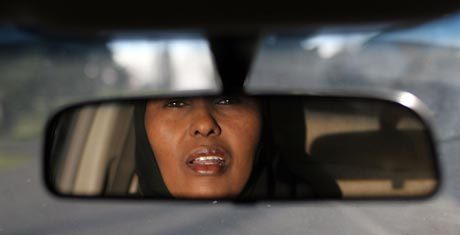
Sunday, April 08, 2007
 |
|
Anisa Ali, a leader in the Somali community, ferries children from the Cascade Apartments to school each morning so they don't have to walk. Ali makes as many as three trips back and forth before heading to work as a case manager at the Refugee Women's Alliance. THOMAS JAMES HURST / THE SEATTLE TIMES |
In a staid conference room recently, nearly two dozen Somali women sat, their clothing a carnival of color, their babies cradled in scarves. One after the other, they called out what they need from the city of Kent — from jobs to transportation to training.
"There you go!" said Anisa Ali, 37, a Somali herself and a caseworker for the Refugee Women's Alliance. "Speak up, girl!"
For the past decade, Ali has worked with the growing Somali community in Kent, translating at local hospitals, connecting friends with jobs, ferrying neighborhood children to and from school so they don't have to walk a mile.
She's done the work mostly as a resident of Cascade Apartments, a public-housing complex in Kent where many Somalis live. Now, as a case manager, she does more, from mental-health counseling to organizing the recent city-funded focus groups for Somalis in Kent.
The size of the Somali community has swelled recently, although Kent officials say they have no reliable numbers to show how much. One indication, though: Seven percent of Kent School District students spoke Somali in the 2004-2005 school year.
Like many refugees, Somalis in Kent have struggled against barriers in language, culture and religion. They worry about boys and girls mixing in gym classes and about employer discrimination because of their traditional dress. Still, it is tough to get the community to speak out.
Ali knew fliers would not be enough to bring Somalis to the focus group. So the day of the event, she knocked on the door of everyone she knew in the Springwood apartments, a public-housing complex on East Hill where many Somalis have settled. An hour later, the conference room at the community center was full.
"You have to have the trust of the community in order for them to participate," said Someireh Amirfaiz, executive director of the SeaTac-based alliance. "Anisa's strong, and she gets the job done."
Born in Mogadishu, Somalia, Ali was separated early from most of her family and raised by her uncle, an educated man who assumed she would become a housewife. She followed his lead instead, taking English classes after school and finding a job at the U.S. Embassy without his knowledge. She came to the U.S. as a refugee in 1991 and began studying nursing in Chicago on a scholarship.
There's no accounting for the independent streak, Ali said. It was just there from the start.
"I feel like I'm the one to take care of myself," she said. "It's not like because I'm Muslim, I have to sit back and wait for my husband to feed me."
As the civil war in Somalia split her family, Ali dropped the dream of studying and worked two jobs to send more money back home. A decade ago, she found work in Kent and moved there. She waited to marry, she said, until she found a man who could appreciate the conventions of modern American life.
Her husband, Abdi Ahmed, a Somali refugee, works as a para teacher in the Kent school district. The couple has three children, and last month bought a house in Federal Way.
For Ali, the work at the Refugee Women's Alliance has so many rewards. One family in particular stands out: six children, including an infant, with parents who could not read or speak English. They came to her in the winter after their electricity had been turned off. Ali took them around to agencies and helped them fill out paperwork to get it turned back on.
She went home and cried that day for the joy of having helped.
Source: Seattle Times, April 08, 2007